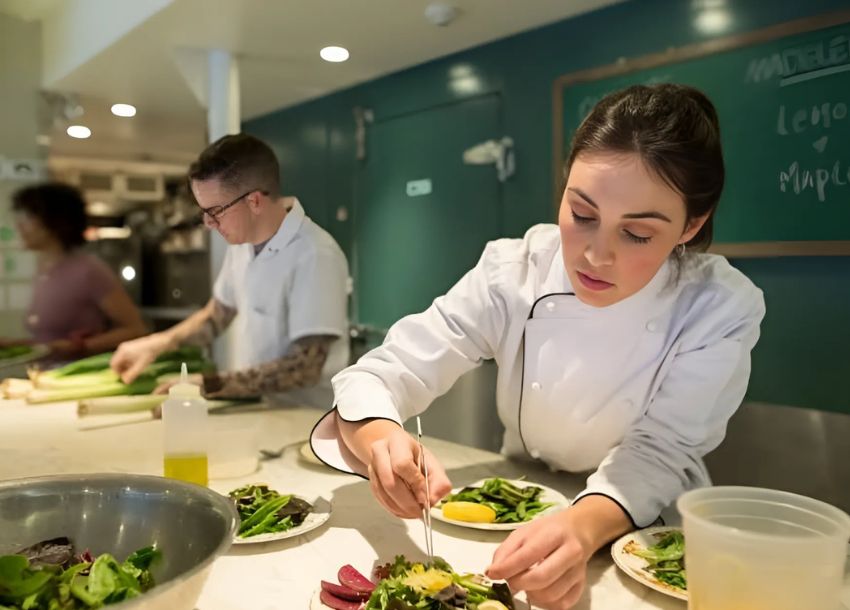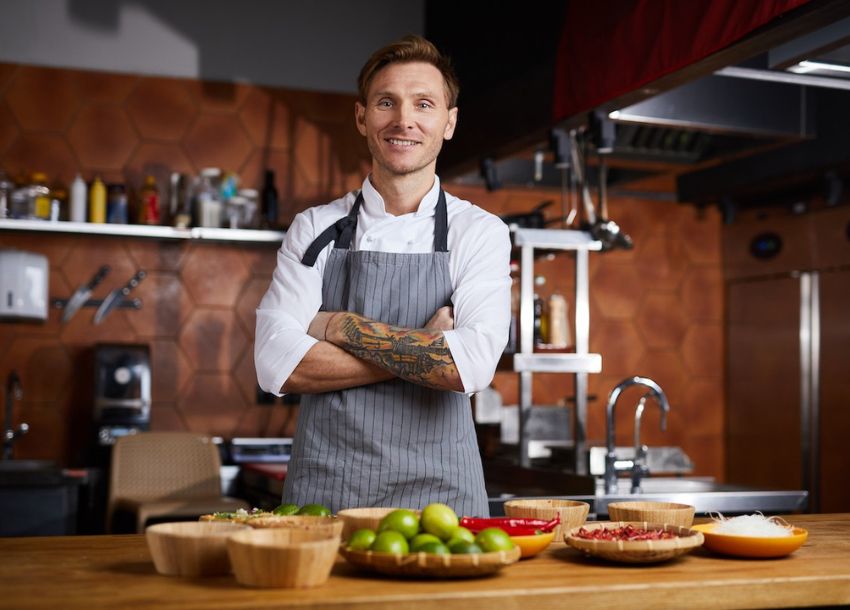Commis Chef Job Description: Duties, Skills & Career Path
- Career Options
- Aug 21
- Share post

Looking at a commis chef job description is the perfect place to start if you’re thinking about a career in the kitchen. This entry-level role is where your culinary journey really begins. It’s the springboard to becoming a chef de partie, sous chef, or even head chef one day.
Here’s everything you need to know about being a commis chef – job description, key responsibilities, required skills, salary expectations, and career path.
What is a Commis Chef?
A commis chef is a junior member of the kitchen brigade who works under a chef de partie (CDP). It’s a hands-on learning role – prepping ingredients, following basic recipes, maintaining hygiene, and helping service run smoothly.
It’s also the point where you begin to understand the discipline of a professional kitchen. You’ll rotate across different sections – veg, grill, sauces, pastry, to build a broad foundation. This rotation makes the commis chef role one of the most important stepping stones in hospitality.
If you’re reliable, passionate, and ready to learn, you’ll fit right in.
Typical duties and responsibilities
These are the most common tasks you’ll be expected to carry out as a commis chef:
- Measure, chop, peel, and portion ingredients.
- Assist CDPs with mise en place and plating.
- Make basic sauces, stocks, and dressings.
- Receive deliveries and rotate stock.
- Clean down stations and keep kitchen hygiene high.
- Follow food safety procedures and kitchen rules.
While these may sound simple, they’re the foundation of every dish and all successful kitchens. Great commis chefs learn to work with speed and precision – because in a busy service, seconds count.
Skills you’ll need to be a Commis Chef
You don’t need years of experience, but you do need the right attitude. Most kitchens will look for:
- Basic kitchen or hospitality experience.
- A food hygiene certificate (or willingness to get one).
- Ability to follow instructions and work fast.
- A calm approach under pressure.
- A genuine interest in food and learning.
Soft skills matter too. Teamwork, communication, and resilience are just as important as knife skills. Being able to take feedback and bounce back quickly is what makes good commis chefs stand out.
Training and qualifications
Not all kitchens require formal training, but many employers prefer candidates who have:
- NVQ Level 2 in Professional Cookery (UK) or equivalent.
- Apprenticeships combining work and study.
- College-based culinary certificates.
Some chefs enter the industry straight from school and learn entirely on the job. Others combine part-time study with kitchen work. Whichever route you take, the key is consistent practice and a willingness to learn.
Commis chef job description and salary (UK)
Salaries for commis chefs in the UK usually start around £23,000 and can rise to £27,000 depending on the kitchen, location, and experience.
You may also get perks like staff meals, uniforms, training, or bonuses in some venues. London kitchens and high-end hotels may pay more. And remember – this role is about building your skills and reputation. The real earning potential comes with progression to chef de partie and beyond.

A day in the life of a Commis Chef
Expect pretty long hours, varied shifts, and plenty of graft. A typical day might involve:
- Prepping vegetables and sauces in the morning.
- Assisting CDPs during lunch service.
- Restocking and cleaning down in the afternoon.
- Getting stations ready for the evening rush.
It’s hard work – but the pace is exciting, and the learning curve is steep.
Career path: where being a Commis Chef can take you
The commis role is all about progression. With time and training, you could move up to:
- 1st or Senior Commis Chef.
- Chef de Partie (section leader).
- Sous Chef (second in command).
- Head Chef (kitchen leader).
Some chefs specialise – in pastry, butchery, or plant-based cuisine. Others explore food development, private dining, or international opportunities.
Wherever you take it, becoming a commis chef is the start of a rewarding journey.
Final thoughts
Starting your career with a commis chef job description in mind gives you clarity on what’s expected and where the role can take you. It’s not just about chopping veg or washing down at the end of service – it’s about developing the discipline, resilience, and teamwork that form the backbone of every successful chef.
Every great head chef began as a commis. This role teaches you the fundamentals that will carry you through the rest of your career: precision, consistency and the ability to thrive in a high-pressure environment. Employers value commis chefs who show up with energy, curiosity, and the drive to improve with every shift.
If you see this as more than just an entry-level role – but rather as a launchpad into the wider world of professional kitchens – you’ll already be ahead of the pack.
–
FAQs
What does a Commis Chef do?
They prep ingredients, support chefs on the line, and help keep the kitchen clean, safe, and organised.
Do I need a qualification?
Not always – but an NVQ Level 2 or college certificate in cookery helps. Most importantly, kitchens want people who show up and work hard.
Is this a full-time role?
Yes, most commis chef jobs are full-time. Expect shifts, evenings, weekends, and bank holidays – it’s part of kitchen life.
How long before I get promoted?
If you’re consistent and keen, many chefs move up from commis to CDP in 1–2 years. Training kitchens often promote quicker.
What’s the career outlook for commis chefs?
Demand remains high, especially in cities and hospitality hotspots. With the right attitude, there are always opportunities to progress.
Comments
Add a comment
Leave a Reply · Cancel reply
You must be logged in to post a comment.



